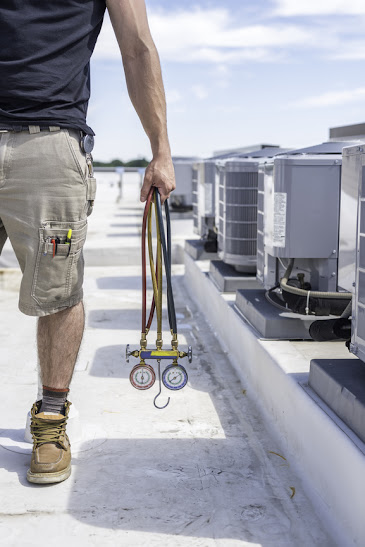How Hvac Tech Is Helping To Combat Covid-19 Risks
Most of us spend the majority of our time in air-conditioned
or heated spaces, whether it’s at home, at work, or at school. As we monitor
the latest COVID-19 information from the Centers for Disease Control and
Prevention (CDC) and other experts, we’ve learned that ventilated air,
particularly in spaces like offices and classrooms, may be able to transmit
the virus. As people begin returning to work and to school, commercial HVAC
companies are now under pressure to adapt their technology to make the air
safer for everyone.
The leading
experts are still studying the role HVAC systems play in transmitting
COVID-19, and while HVAC systems may not be wholly responsible for
transmission, the experts have cautioned against groups of people gathering in
ventilated places. But with many workplaces starting to re-open and students
heading back to the classroom, commercial building owners find themselves
responsible for providing as safe an environment as possible using the latest
HVAC technology.
How can HVAC systems make the air safer?
To start, rest assured that it’s not necessary to install an
entirely new ventilation system. This would be expensive, time-consuming, and
impractical all around. Instead, we can look to commercial buildings like
hospitals and other healthcare facilities that already have very high standards
regarding air hygiene. Due to the fact that many vulnerable and
immunocompromised people stay in or visit these facilities on a daily basis,
it’s essential that the air be as clean as possible.
The HVAC systems in hospitals and other medical facilities
are designed to minimize airborne infections like COVID-19, and these HVAC
systems use four methods to stop the spread of infectious air particles:
disinfection, pressurization, dilution, and filtration. Unfortunately, some of
these methods are limited to hospitals and can be costly to implement.
Because it’s not feasible to integrate all of these methods
into existing commercial HVAC systems, we recommend focusing on disinfection
because certain disinfection methods can be easily incorporated into your
existing HVAC system. Hospitals and other medical facilities use special
ultraviolet devices in their ventilation ducts to kill all microorganisms that
live in the air, and there is evidence to suggest that ultraviolet
light kills COVID-19.
These ultraviolet light systems can be installed in your
ventilation ducts in the ceiling, and they’re some of the most commonly-used
systems for air hygiene and safety in places like airports and hospitals. But
as offices, factories, and classrooms open up again, we predict we’ll see an
increase in building managers who are interested in installing ultraviolet
systems in their spaces.
Ask your commercial HVAC contractor
For commercial building owners, the health and safety of
everyone on the property is the number one priority. If you’re concerned about
air hygiene or want to know what’s possible with your current ventilation
system, we recommend contacting your trusted HVAC commercial contractor who can
recommend ways to sanitize your building’s air. HVAC companies are still
learning about the role ventilation plays in COVID-19 transmission, and as they
work to adapt their technologies to the latest information, we hope to see more
efficient and readily-available methods of air purification in the near
future.
For more information about how we are adapting commercial
ventilation systems to kill any microorganisms including COVID-19 and
provide safer ventilation, or if you have any questions, please contact Tri-Tech Energy today.
Discover why so many people in New Jersey choose us as their trusted commercial HVAC contractor. Our team
is standing by and we look forward to hearing from you.
Original content is posted on https://www.tritechenergy.com/blog/hvac-tech-helping-combat-covid-19-risks/


Comments
Post a Comment